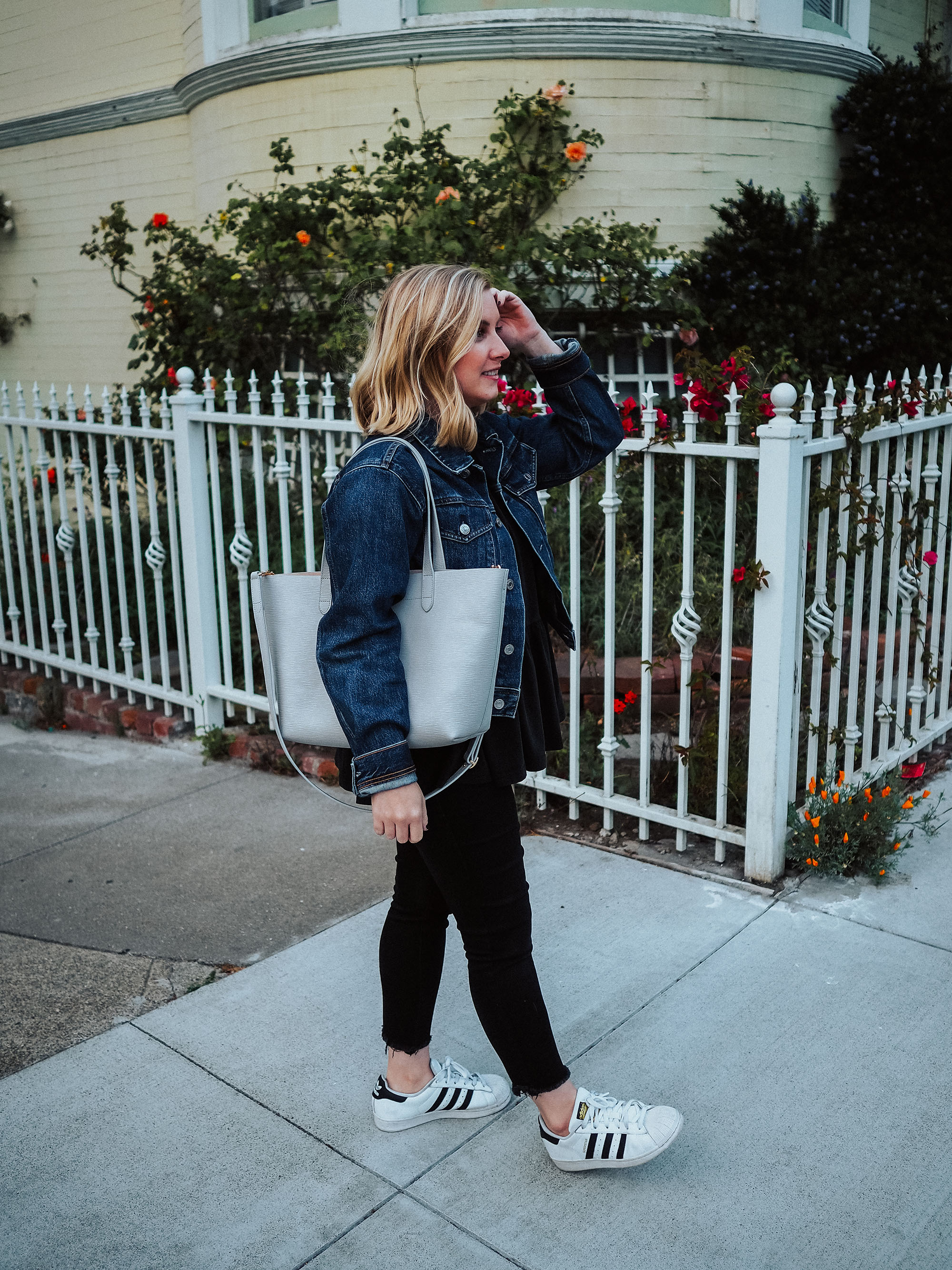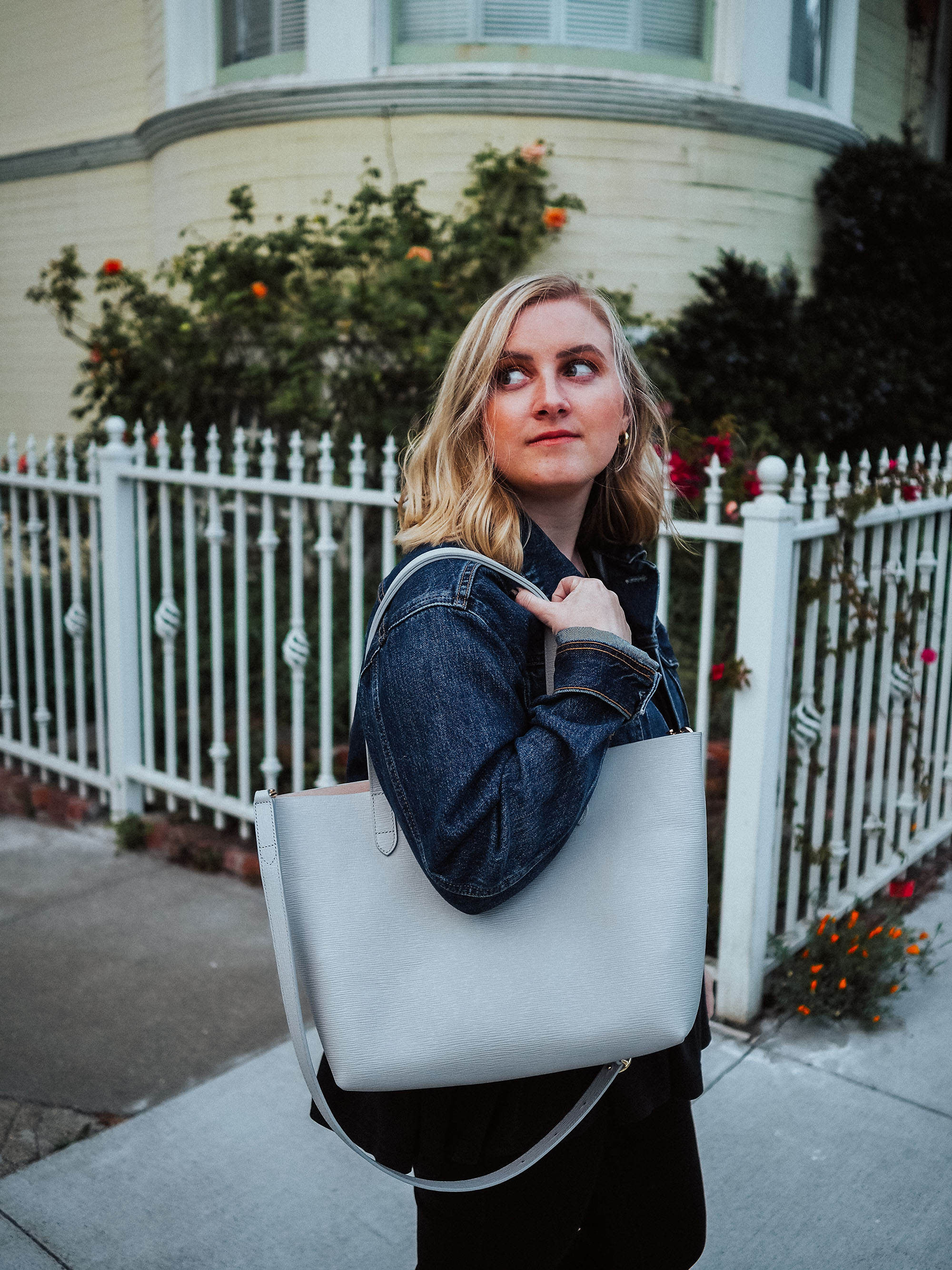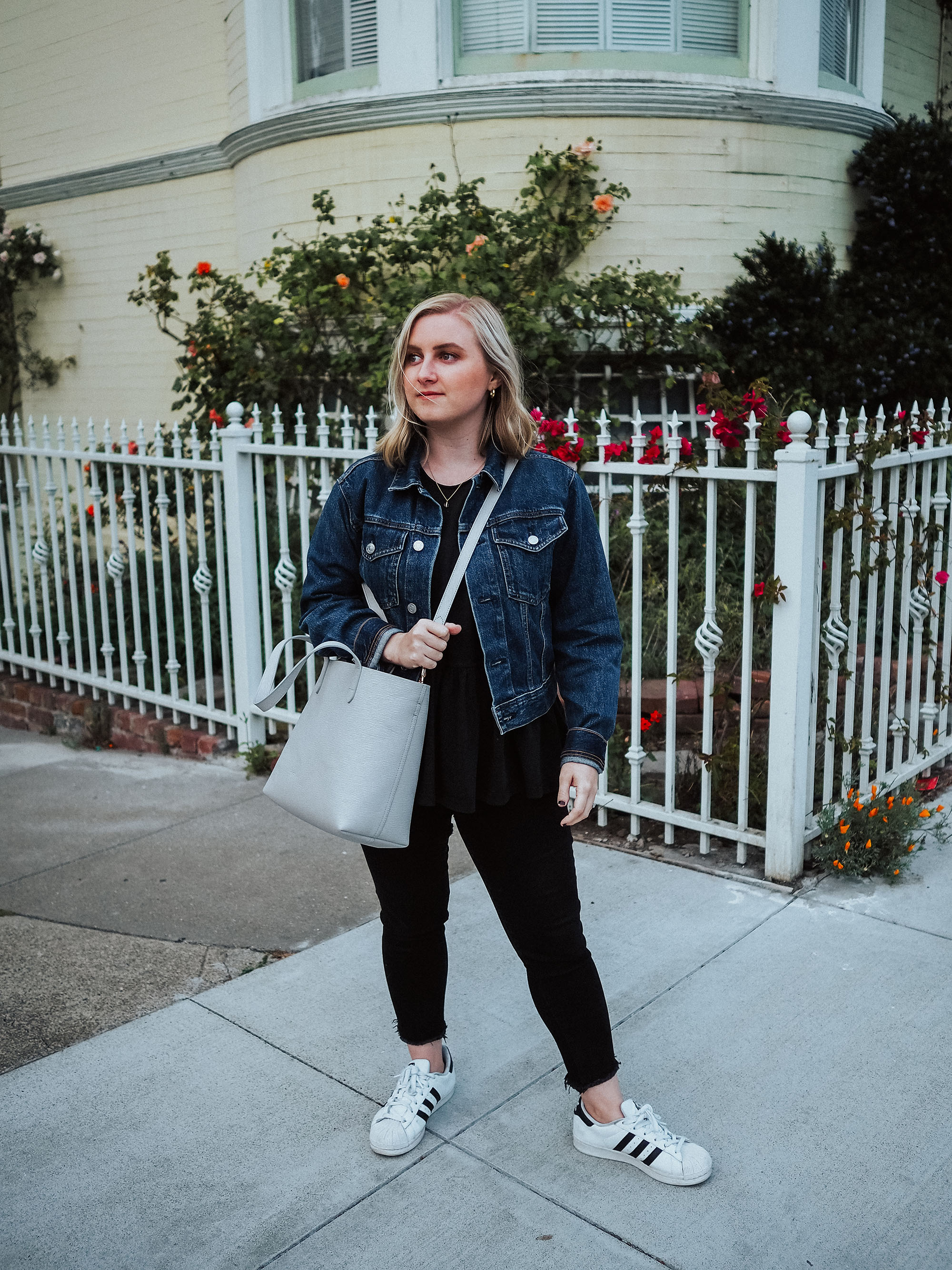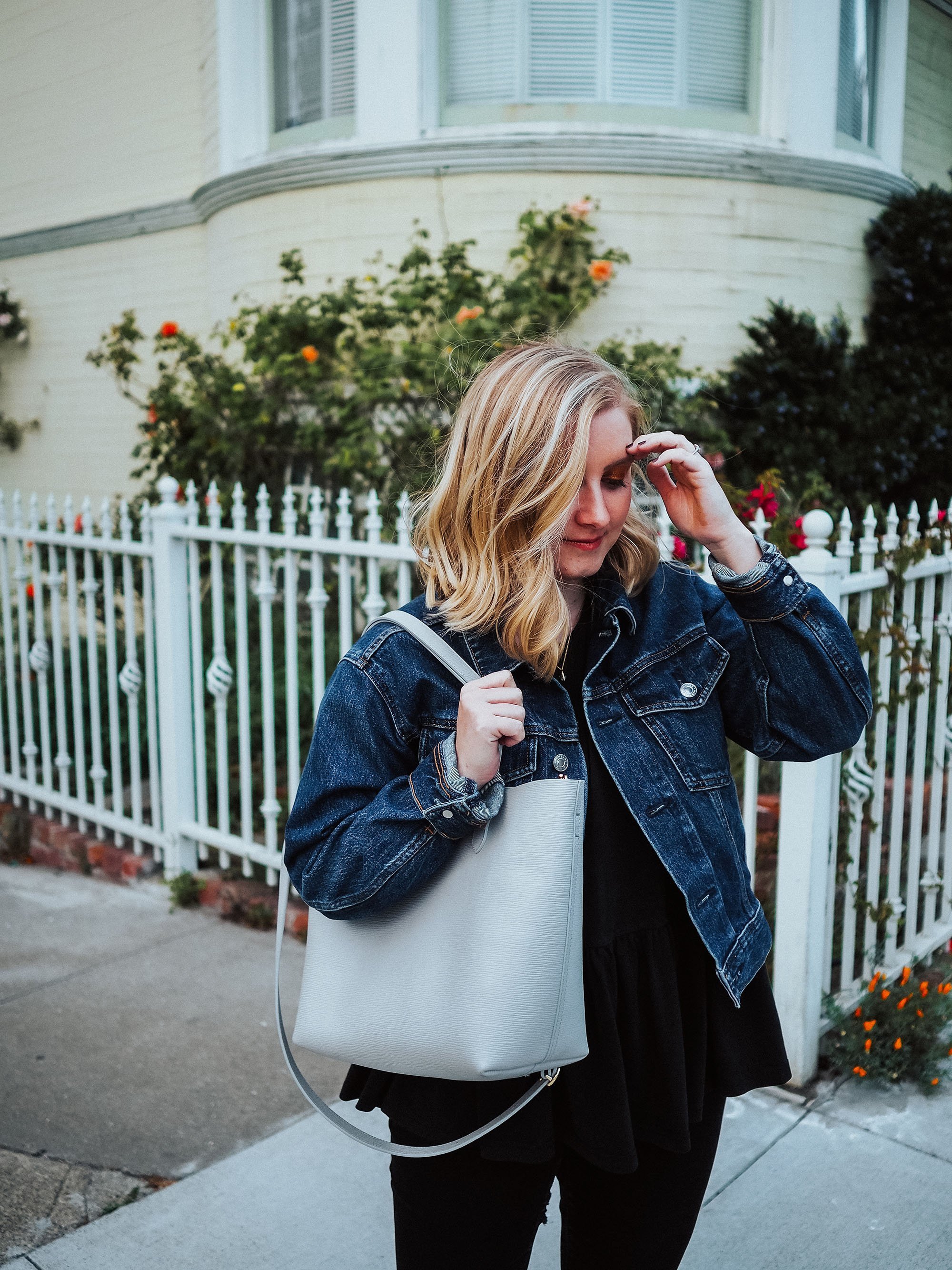I have a lot of feelings about Shein. Transparently – they’re not very good feelings. So many fashion blogs and bloggers write a Shein review discussing sizing, talking about shipping speed and pricing…but so few are blatantly addressing all the problems with Shein as a company.
If you actually do want to shop Shein and are looking for a relatively positive Shein review – this blog post isn’t for you. But if you’re after a brutally honest review of the company, its practices, and its products – I’m your girl.


Why I’m actually qualified to talk about the ethics and sustainability of fashion companies.
Not only do I have my B.S. in Apparel Merchandising & Design, but I also spent five years working in corporate merchandising for a large, national fashion brand. I’ve seen the behind the scenes of how styles are designed, produced, priced, and merchandised. Because I know how the machine works, I know how to gut check if a brand is worth shopping.
My disclosure for the lawyers.
All statements in this blog post are my own opinions. These statements are not facts.
My brutally honest Shein review.
The tldr.
Don’t shop Shein if you can avoid it. Shein is a massive fast fashion company with a focus on producing the trendiest items at warp speed and at the lowest cost. While these low price tags may make the trendy masses love Shein – ultimately the “real” cost of these items comes in the form of potential pollution, increased waste in landfills, potentially unfair labor wages or working conditions, and cultural appropriation.
What is fast fashion and why is it bad?
Fast fashion is fashion produced quickly and cheaply with the intention to capitalize on a trend. Fast fashion skimps on quality in the name of trendy, cheap clothing that allows consumers to post their outfit on Instagram and promptly toss the no longer fashionable item of clothing into the trash. Fast fashion is bad because it promotes increased consumerism (more shopping to follow trends) and increased waste (cheaper quality items end up in our landfills fast). While it may be tempting to buy clothes from fast fashion retailers to be able to try out a trend cheaply, ultimately this way of shopping hurts the environment and the laborers making said styles.
Which, speaking of the laborers making those fast fashion items we know and love so much.
A dress priced at $8 is only able to be priced at $8 because of cheap materials and cheap production costs. This means the cost of labor is heavily negotiated. Fast fashion is all about selling styles in mass quantity and preserving those razor thin gross margin dollars – garment workers often suffer the most in this deal. There have been seemingly endless horrifying stories of unsafe working conditions for factory workers, from factory fires to factory collapses. Garment Worker Center, an LA based non-profit, states that, “Approximately 85% of garment workers do not earn the minimum wage and are instead paid a piece rate of between 2-6 cents per piece. Most garment workers work 60-70 hour weeks with a take home pay of about $300 dollars.”
“The Department of Labor has found that a number of major brands pay such low prices for their garment orders that the supplying factories they use are financially unable to comply with minimum wage requirements.”
Unfortunately even international brands that swear they following all labor laws and fair wage laws in the countries they produce in may be subtly pulling the wool over your eyes. Foreign countries may have much lower standards of safe working conditions and fair pay than the U.S. Just because a company is abiding by all labor laws and wage guidelines in a foreign country, doesn’t mean they’re paying workers fairly or that said workers are in safe conditions by United States standards.
Shein is, first and foremost, a fast fashion company.
Garment workers deserve to be paid fairly for their work and also deserve safe working conditions. I want to be clear: I am not outright accusing Shein of any specific infractions or abuse. What I am accusing Shein of is being a fast fashion company that promotes mass consumerism at a potential cost to the workforce and environment.

There are situations when shopping fast fashion is morally okay.
The ethics of shopping fast fashion do not apply to those who shop fast fashion as a need. Choosing where to shop and holding brands to high ethical and sustainable standards is a privilege. Those who shop fast fashion because it’s what is affordable are not in the wrong – those who shop fast fashion hauls (and especially promptly show them off online and on social media) are the problem. If you are buying fast fashion in mass simply because it’s fun for you and not because you have to – you’re part of the problem.
The real problem are the mass consumers and influencers.
To all the influencers out there hauling large quantities of Shein clothing and posting Shein reviews with all your spoils: please pause and reflect. Are you encouraging shopping habits that are good for the planet and its people? These questions are rhetorical. The answer is simply no.
Shein has been accused of cultural appropriation more than once.
Even putting Shein’s roots as a fast fashion company aside, there are still further ethical infractions by the company. Shein has been accused quite a few times now of cultural appropriation. Take the “frilled Greek carpets” incident, where Shein sold mats picturing the Kabaa (a building in the centre of Mecca) on them. And honestly who could forget the great Shein swastika incident of 2020. Yes, there is such a thing as a Buddhist swastika – but Shein’s lack of clarity in the marketing of this product managed to offend thousands of customers within hours.
Shein isn’t alone in the camp of fast fashion companies culturally appropriating and selling potentially racist products and campaigns like it’s going out of style. PrettyLittleThing launched an “oriental” collection. H&M displayed questionable advertising of a Black child wearing a hoodie with the text, “coolest monkey in the jungle.”
The thing to ask ourselves here is even if the clothes are sometimes cute, do we really want to support brands who profit off other cultures and races? Hard pass.
Evaluating Shein’s sustainability claims.
Shein does have a (admittedly not particularly helpful) social responsibility webpage on their site. It’s nice to see Shein has this page, and it’s nice to see so many topics addressed – but if you actually hold the claims up to any sort of standard, they tend to fall flat.
Shein claims to produce only 50-100 pieces per new product.
Shein claims to only produce products in mass when they know customers will purchase them. “Only when we confirm that a style is in high demand, do we implement large-scale production.”
This is a lovely sentiment, because it means Shein doesn’t mass produce items that have no demand (which would really add to the landfills). That said – this mindset is still problematic. Producing any amount of fast fashion isn’t sustainable or green, so claiming limiting the production of fast fashion is a bit of an oxymoron. You don’t get bonus points for producing less junk when you’re still producing junk.
Shein claims to use environmentally conscious production practices.
Shein does claim to utilize sustainable materials. “When selecting materials, we do our best to source recycled fabric.” The problem with this statement is that there’s no way to quantify what Shein means when they say they “do our best” to source recycled fabric. For this to be a truly transparent statement about their commitment to sustainability, we’d need to see current facts and figures for recycled materials used, projections for the future, and goals for the future. “Do our best” doesn’t tell us what you’re actually doing nor does it tell us what you intend to do in the future.
Shein claims to follow all laws when it comes to human trafficking, slavery risks, and all around safety and fair pay of garment workers.
Prepare yourself for a mouthful, because I do think it’s important to include Shein’s full statement on labor practices in this blog post:
“We regularly evaluate and address human trafficking and slavery risks in product supply chains through in-house inspectors who are tasked with investigating internal or third-party reports of this nature. We conduct audits of our suppliers through in-house and third-party inspectors who evaluate compliance with company standards for trafficking and slavery, using both announced and unannounced audits. In the United States, we work cooperatively with the Department of Labor on suppliers’ compliance with wage and hours laws. We require our direct suppliers to certify that materials incorporated into products they supply to SHEIN comply with laws and company standards regarding slavery and human trafficking. We maintain internal accountability standards and procedures for employees and contractors who fail to meet company standards regarding slavery and human trafficking. We provide training to specific employees and management on detecting and enforcing procedures against slavery and human trafficking.”
I appreciate that Shein has this statement publicly displayed and accessible on their site. The tldr on this one is Shein claims to conduct audits and require their direct suppliers to certify that production complies with laws and company standards – but no where on the Shein website are those standards listed for public viewing. This statement also primarily focuses on slavery and human trafficking, not fair wages and safe working conditions. I was unable to find any specific statements or company documents regarding those policies.
Shein lacks transparency and greenwashes their level of social responsibility.
All in all – these statements just don’t have a lot of actual weight. Us, the consumers, are being told to essentially trust these statements at face value with little additional information, insight, or commitment.
To me, it’s not enough.

But Kelsey…is Shein legit when it comes to the actual clothing?
Lolz. No.
Here’s the absolute truth: I used to shop Shein. In fact, I was even on Shein’s PR list for a little while. The reality of the Shein influencer PR strategy (at least back in 2016) is offering microinfluencers free clothing in exchange for required content production and posting (…which one might say is essentially offering an $8 dress in exchange for hours of “free” labor…). Not exactly a cute look on the fair wages front.
But I digress.
The point is yes, I’ve shopped Shein myself in the past. And no, the clothing isn’t high quality. Please see exhibit A of the poorly produced sundress that looked a whole lot different on the model in photographs on the Shein website. Not only did this dress not fit me properly, and the return policy wasn’t favorable at the time (nor were there free returns), but the dress started falling apart pretty quickly after receiving it. Given the price of the dress, the cheap materials, and likely the cheap production – what could I really expect?
Shein clothing reviews I often see online focus on shipping speed, pricing, and how “cute” the items are in person. Rarely do I see anyone addressing is Shein bad when it comes to the actual clothing quality. In my experience, the quality isn’t great. And the fact that it isn’t great isn’t shocking.
Shein’s use of microinfluencer “gifting” programs is essentially requiring microinfluencers to work for free.
As previously stated, I absolutely was on the Shein PR list for a little while. I only received two packages total because it became quickly clear to me I was essentially working for free. I can’t speak to Shein’s current influencer marketing strategy, but several years ago posting on your blog or Instagram was a requirement if you were to receive any product from Shein. To the average consumer this may seem like a sweet deal. To the microinfluencer who spends real money and literal hours planning their outfits for a shoot, scouting locations, hiring photographers, editing photos, crafting perfect captions, and posting – it’s kind of a shit deal.
All hope isn’t lost.
Where you should shop instead of Shein.
Excessively low prices may be an indicator that a company produces fast fashion.
Instead of shopping fast fashion companies with questionable products, questionable ethics, and questionable customer service – opt for companies that are actually making effort and impact when it comes to the things that matter.
Shop from brands that are priced fairly, not excessively cheaply.
The unfortunate reality is that in order to produce products made from sustainable, high quality materials and pay the workforce fairly to do so – it costs money. I would argue it’s going to be fairly tough to find an $8 dress that is sustainable and/or ethical. But that doesn’t mean you can’t find sustainable or ethical brands selling items for a truly fair price.
There’s no brand pricing their products perfectly. The thing to stop and ask yourself before buying anything new is, “what is the real cost of this item?” If you’re holding up a paper thin t-shirt priced at $5, the likely answer is the cost to the environment and workforce is high.
Avoid shopping from brands that lack true transparency.
As we’ve learned, just because a brand posts a social responsibility webpage on their site it doesn’t mean they’re actually a transparent company. Transparent companies post the company policies for things like fair wages, labor practices, safe working conditions, etc. Transparent and ethical companies also don’t rely on compliance to local labor laws, but rather establish their own, higher company standards to enforce.
If you can easily find a social responsibility page on a brand’s website, that’s a start. If the page contains actual facts, figures, and goals when it comes to ethics and sustainability, that’s a win. We can’t expect brands to be perfect right out of the gate, but we can expect them to have goals to improve.
Learn how to spot greenwashing.
Brands are smart and they’re catching on to the fact that consumers increasingly care about how the things they buy are produced and impact the environment. In response, many fashion companies have launched “sustainable” capsule collections (such as this line from H&M or this line from Walmart). We should thank these companies for taking a step in the right direction, but ultimately know this for what it is: greenwashing.
When companies produce small capsule collections that are sustainable, they’re essentially checking a box and playing to our emotions as a consumer, leading us to hope and believe we’re “shopping better.” Small sustainable collections are nice, but they’re rather insignificant in the grand scheme of things. Shopping these “sustainable” collections from a larger brand that isn’t sustainable at its core is unfortunately falling for the brand’s greenwashing. We have to hold them accountable.
Shop less.
We live in consumer culture. Hauls frequently trend on social media and YouTube. Influencers are posting outfit photos and rarely, if ever, outfit repeating. Trends like tiny sunglasses and bags, dad sneakers, and more are running rampant. It’s natural to want to both consume and follow trends. It’s even normal, understandable, and acceptable to do so reasonably. My ask is to try to consume less wherever and whenever possible. Shein said it themselves – they only produce more when we shop more. If we shop less, they’ll produce less.
Know that, ultimately – it’s not your responsibility to save the planet.
It’s been largely proven and accepted that it isn’t the consumers causing the negative impact to our planet: it’s companies and brands. We as consumers can try to do our part by consuming less and shopping responsibly where possible – but ultimately it is the companies that we need to hold accountable.
Just do your best.
I’ve long ago stopped being the sustainable and ethical shopping tyrant because it doesn’t serve anyone. We all are just trying to do our best. As long as we try to shop responsibly, do a little research before buying, and overall try to consume less – we’re doing amazing, sweetie.
You can check out my other popular Shein review blog post here.
